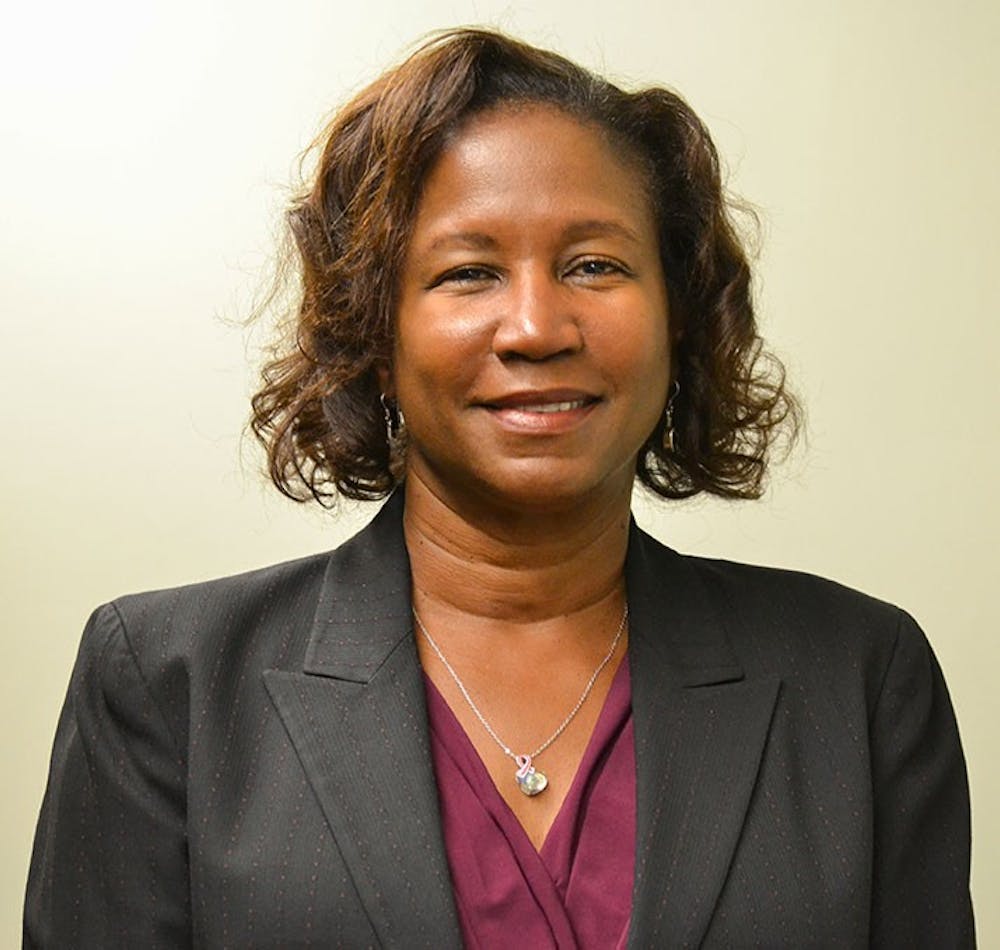Seated in a conference room in the Shippensburg University president’s office, President Laurie Carter discussed her past as well as her professional experiences, and the challenges still facing SU midway through her first semester as the university’s 17th president.
Carter is both SU’s first permanent female and African-American president, and is the official replacement to former SU President George “Jody” Harpster, who retired in January. After Harpster’s retirement, Provost Barbara Lyman served as SU’s interim president until Carter’s appointment in August.
Recalling her life just after finishing high school, Carter said it was the attention she received from staff and faculty members as an undergraduate student at Clarion University that inspired her to dedicate herself to the collegiate world.
“I think my preparation for this role started when I was an undergraduate student at Clarion,” Carter said. “I was an out-of-state student, I was five-and-a-half hours away from home, and I was just there. It was the staff, the faculty and the other students that really helped me have a full and wonderful collegiate experience.”
After graduation, Carter took a job at Fairleigh Dickinson University in Teaneck, New Jersey, as the university’s residence life director.
Two years later, Carter saw an advertisement in The New York Times seeking a director of student affairs at The Juilliard School. Carter, who has been interested in the arts her entire life, applied and was hired for the position.
“I said to myself, ‘Wow, this is a really interesting way to bring together my passion for the arts with my skill set,’” Carter said.
At Juilliard, Carter authorized the construction of a residence hall, created student activities, oversaw international student advisement and led orientation and educational outreach programs, all while attending law school part time.
“I was prepared to go off and become a prosecutor, but the pull of my work with students was what eventually led me to make the decision to stay at Juilliard,” Carter said.
Carter’s time at Juilliard ended abruptly when her mother was in a near-fatal car accident and suffered a brain injury, forcing her to move into Carter’s home.
“I could not continue the intense work I was doing and care for her,” Carter said.
Instead, she left Juilliard and took a position at the New Jersey Performing Arts Center, the third largest arts education center in the country, according to Carter.
When her mother was well enough to return home, Carter received a call from a friend, offering her a position as executive vice president of university counsel of Eastern Kentucky University (EKU).
During this time, EKU became increasingly strong academically and saw historically high student enrollment rates, according to Carter.
“We were just breaking records for success,” Carter said. “There was a united effort.”
Prior to her arrival at SU, Carter worked in numerous collegiate settings that led her to make some of her earliest decisions as president, including the reorganization of SU’s administration and the addition of new positions.
Carter said her time at EKU helped her to recognize the issues facing SU, and prepare better solutions to solve those issues.
She said one of SU’s roadblocks to success is a lack of unity among the university’s administration.
“Everyone needs to step away from their silo and put students first,” Carter said. “Every student deserves to have a quality academic experience.”
Throughout the majority of Pennsylvania State System of Higher Education (PASSHE) universities, a decline in enrollment rates has continued, causing Cheyney University to lose more than half of its student population since 2010, according to the Pittsburgh Post-Gazette.
Carter placed the majority of the blame for PASSHE’s declining enrollment rates on a national decrease in the number of students
graduating from high school, and said SU needs to think creatively to recruit new students.
“The enrollment puzzle is not just about undergraduate students,” Carter said. “It’s a pie, not just one piece.”
Although SU faces financial concerns similar to other PASSHE schools, Carter said the per-credit tuition model, which has been in place for the last several years, has helped to solve the university’s budgetary issues.
“Part of the reason the model was put into place was to help with the budget, and it did. We’re looking at data right now to see if it’s working with the student body, and so far we’ve received really mixed reviews [from students],” Carter said. “There are always possibilities that things can be reformed if they’re having a negative impact on the student body.”
On Oct. 2, Carter sent an email to all SU students announcing a reorganization plan, including the creation of the enrollment management and student success division and a shuffling of responsibilities between administrators.
“[This way], we can have more boots on the ground, and be more visible in other parts of the state,” Carter said. “When you looked at the reorganization, we shifted some things around and added a vice president for student success, which is absolutely essential to [the university’s] success.”
Throughout the remainder of the year, Carter plans to make herself accessible to students through a “pizza with the president” event, as well as an event that will allow students to create artwork to hang inside the president’s residence, the Martin House. Additionally, a newly formed student advisory council is scheduled to periodically meet with Carter to discuss student concerns.
“I want to bring the university forward for the benefit of our students,” Carter said. “That will remain my vision during my entire tenure, which I hope will be long.”




The Slate welcomes thoughtful discussion on all of our stories, but please keep comments civil and on-topic. Read our full guidelines here.